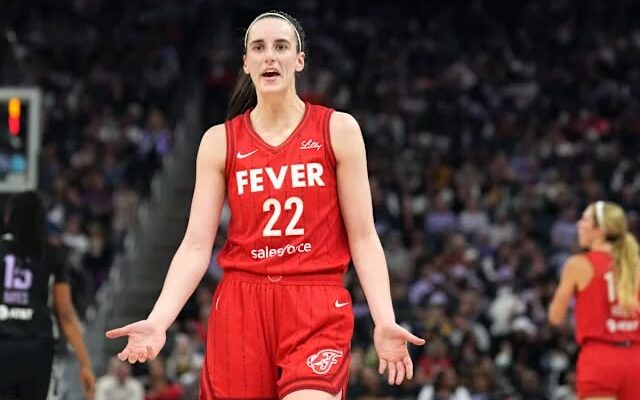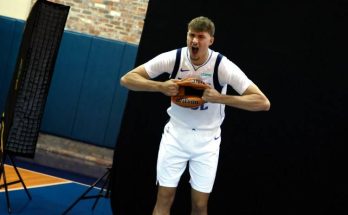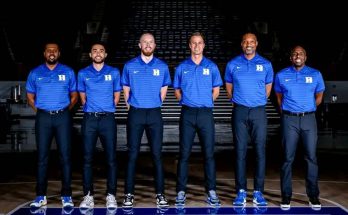As the Indiana Fever bask in the glory of their historic Commissioner’s Cup victory, achieved notably without their superstar, Caitlin Clark, the focus remains squarely on her return to the court. However, Indiana Fever Head Coach Stephanie White has shed light on the primary factor influencing Caitlin Clark’s prolonged absence: Clark’s strong aversion to playing under minute restrictions. This revelation, made during media availability on Friday, July 4, 2025, underscores a cautious, long-term approach to Clark’s recovery, prioritizing her enduring health over a hastened comeback.
Caitlin Clark has been battling injuries throughout her sophomore WNBA season in 2025, a stark contrast to her collegiate and rookie professional career where she displayed remarkable durability. She previously missed five games earlier in the season due to a left quad strain. More recently, a left groin injury, sustained after the Fever’s June 24 game against the Seattle Storm, has sidelined her for what is now her fifth consecutive game (as of July 5, 2025, against the Los Angeles Sparks). This means Clark has missed a total of ten games this season, compared to just nine appearances.
Despite her absences, Clark’s impact on the court has been undeniable, averaging 18.2 points, 8.9 assists, and 5.1 rebounds per game. Her playmaking ability and scoring prowess remain crucial to the Fever’s offense. However, the decision to keep her sidelined, even for high-profile games like the Commissioner’s Cup final, has been a calculated one by the coaching and medical staff.
Speaking to Fever reporter Tony East and other media members, Coach White provided an update on Clark’s rehabilitation and revealed the pivotal obstacle to her return.
“We went through semi-live shooting drills,” White stated, detailing Clark’s progression. “She still hasn’t gone full speed in a practice or live defensive group, but she has been getting some three-on-three work on her own.”
However, White then delivered the crucial insight: “The biggest thing is she’s said she doesn’t like minute restrictions. If there’s going to be one, maybe we’ll hold her out another game.”
This isn’t a new sentiment from Clark. She has previously articulated her “all-or-nothing” competitive philosophy. As reported by The Indianapolis Star earlier in the season, Clark stated, “I’m not a huge fan of minute restrictions. I think that’s silly. I told them I don’t want to come back unless I’m 100%, a full go.”
Coach White reiterated her alignment with this approach, emphasizing the long-term well-being of her franchise player. “We’ll re-evaluate her in the morning, see how she’s handled the added load over the past few days, and decide from there,” White said ahead of the July 5th game. “I prioritize her long-term health and wellness and ensuring that when she comes back, she’s 100%.”
While minute restrictions are a common protocol for athletes returning from soft tissue injuries like groin strains, designed for gradual reintegration and to prevent re-aggravation, Clark’s and White’s stance highlights several important considerations:
- Competitive Drive: Caitlin Clark is an intensely competitive athlete. Playing on a restricted minute count can be incredibly frustrating for players who are accustomed to being on the court for extended periods and dictating the flow of the game. It can disrupt their rhythm, make them feel less impactful, and go against their innate desire to contribute fully.
- Risk of Re-injury vs. Effectiveness: While minute restrictions aim to mitigate re-injury, some athletes and coaches believe that inconsistent playing time can paradoxically lead to less effective conditioning and a higher risk of injury when the player is on the court but not fully warmed up or in game rhythm. For a player like Clark, whose game relies heavily on explosive movements, quick changes of direction, and high-intensity bursts, being limited might do more harm than good in terms of her overall performance and injury risk.
- Team Dynamic and Flow: Clark’s game is highly ball-dominant and she commands significant offensive responsibility. Integrating her back into the lineup on a strict minute restriction could disrupt team flow and chemistry, especially for a Fever team that has, out of necessity, adapted to playing without her and developed different offensive sets. Bringing her back at less than 100% could create more issues than it solves.
- Long-Term Health: Both Clark and White are clearly prioritizing her career longevity. Clark is the face of the WNBA and a generational talent. Pushing her back too soon or asking her to play at less than full capacity, potentially exacerbating the injury, would be a catastrophic outcome for both her and the league. The cautious approach suggests a strategic decision to ensure she avoids chronic issues.
- Fan Management: While fans are clamoring for Clark’s return, White’s honesty about the minute restriction preference also serves to manage expectations. It explains why Clark won’t be rushed back, even if she looks “almost ready” in practice. It sets a clear boundary: she returns when she’s fully ready, not just “ready enough” for a limited role.
The Commissioner’s Cup victory without Clark serves as a powerful testament to the Fever’s growth and depth. The team demonstrated its ability to win high-stakes games through collective effort, improved defense, and the emergence of other key players like Natasha Howard (who earned Cup MVP), Aliyah Boston, Kelsey Mitchell, and the recently acquired Sophie Cunningham (who had a strong game in the Cup final herself). While the controversial ESPN expert’s claim that the Fever are “more dangerous” without Clark faced backlash, the Cup win did show that the team has developed a resilience and diverse scoring options that will benefit them when Clark eventually returns.
Caitlin Clark is expected to be re-evaluated daily, with her next potential opportunity for return being the Fever’s game against the Golden State Valkyries on Wednesday, July 9. However, the key takeaway from Coach White’s update is that Clark will only return when she feels 100% and is able to play without the hindrance of minute restrictions. This patient and player-centric approach aims to ensure that when the WNBA’s biggest star does step back on the court, she is truly ready to shine at her full, unrestricted potential.



